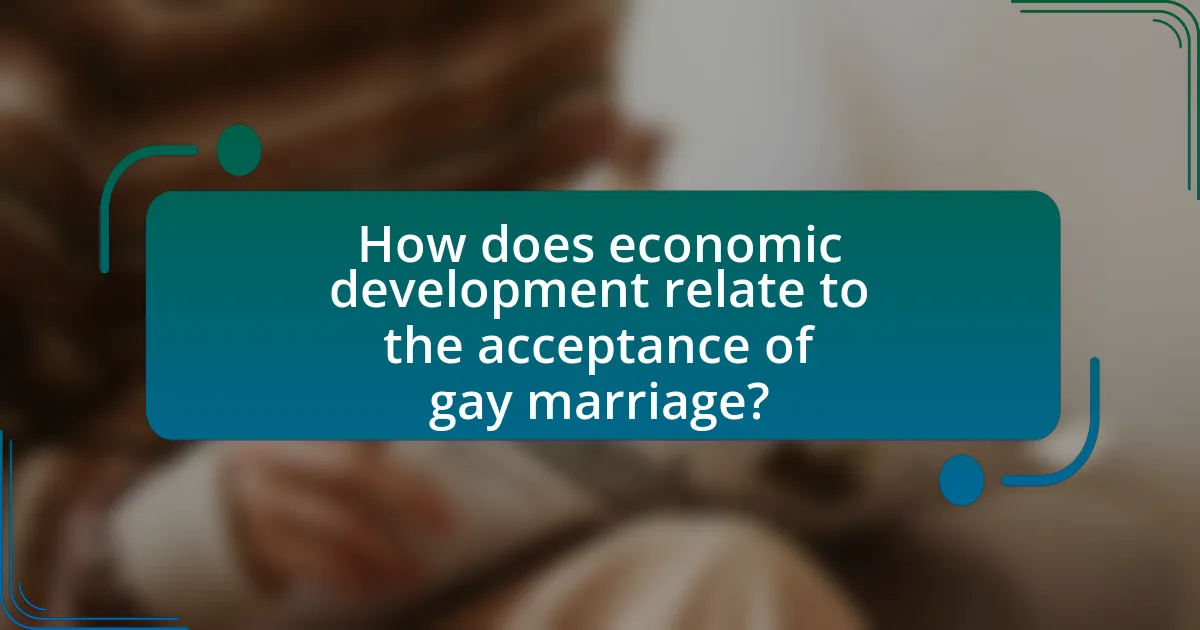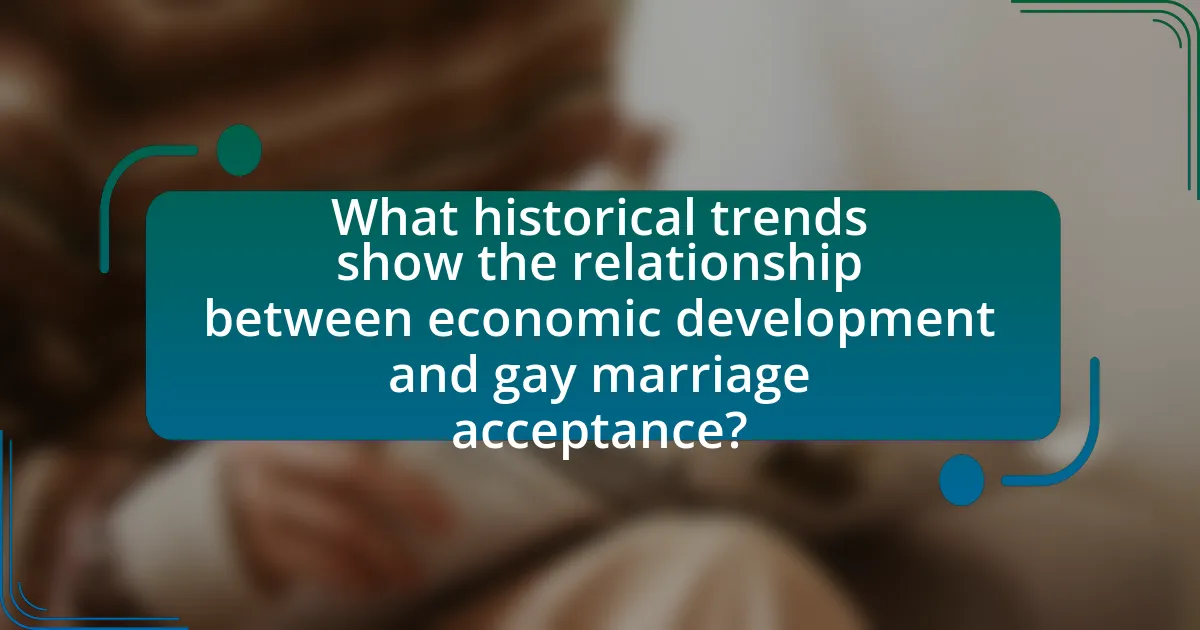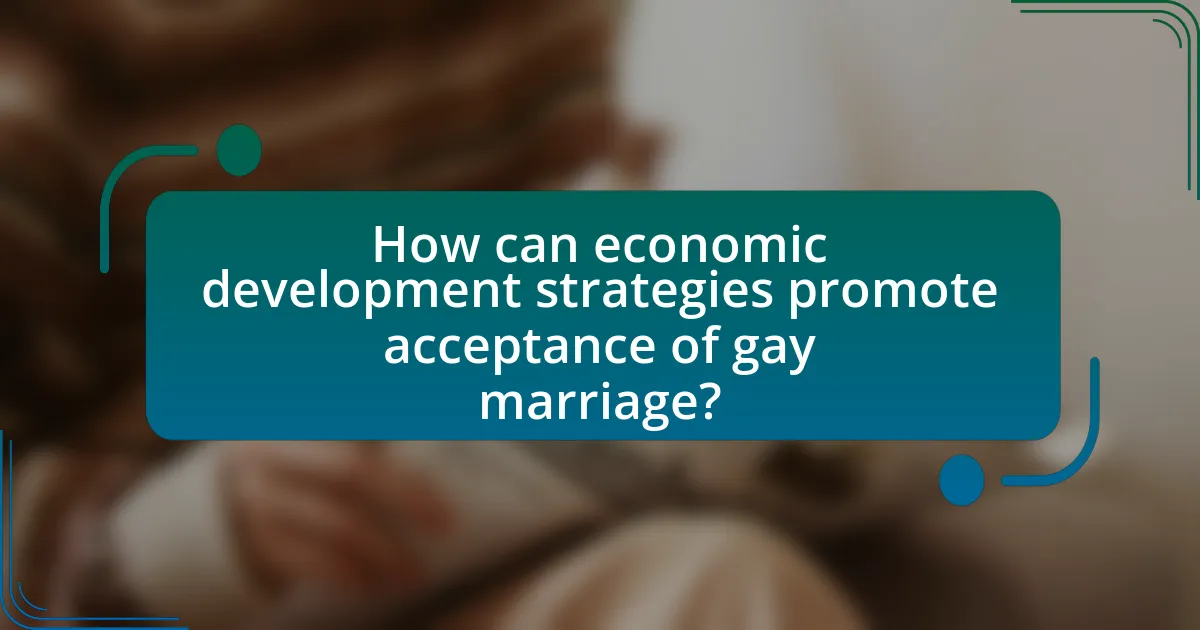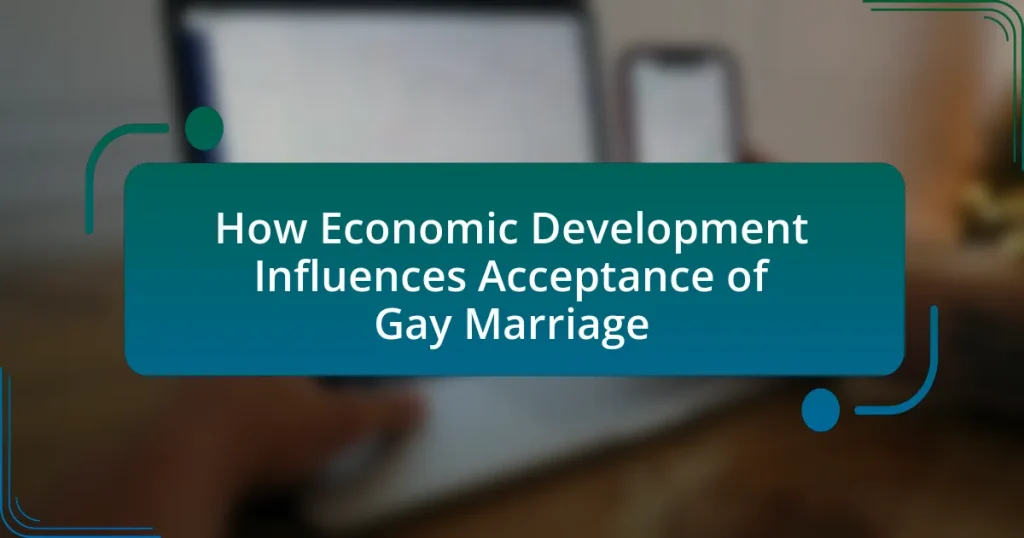The article examines the relationship between economic development and the acceptance of gay marriage, highlighting that higher economic prosperity correlates with more progressive social attitudes towards LGBTQ+ rights. Key indicators of economic development, such as GDP per capita, literacy rates, and employment levels, are discussed in relation to their influence on societal attitudes. The role of education in fostering acceptance, the significance of gay marriage in promoting equality, and the economic benefits observed in countries that have legalized same-sex marriage are also explored. Additionally, the article addresses how community engagement and inclusive policies can enhance acceptance and contribute to economic growth.

How does economic development relate to the acceptance of gay marriage?
Economic development positively correlates with the acceptance of gay marriage, as higher levels of economic prosperity often lead to more progressive social attitudes. Research indicates that countries with advanced economies, such as those in Western Europe and North America, tend to have more inclusive policies regarding LGBTQ+ rights, including the legalization of same-sex marriage. For instance, a study published in the “Journal of Economic Perspectives” by authors like Andrew B. Whitford and others highlights that economic growth fosters education and exposure to diverse perspectives, which in turn promotes acceptance of marginalized groups. Additionally, data from the Pew Research Center shows that in nations with higher GDP per capita, public support for gay marriage is significantly greater compared to those with lower economic development.
What are the key indicators of economic development?
Key indicators of economic development include Gross Domestic Product (GDP) per capita, literacy rates, life expectancy, and employment rates. GDP per capita reflects the average economic output per person, indicating the overall economic health of a country. Literacy rates measure the education level of the population, which is crucial for workforce productivity. Life expectancy serves as a proxy for healthcare quality and living standards, while employment rates indicate the availability of jobs and economic opportunities. These indicators collectively provide a comprehensive view of a nation’s economic progress and social well-being.
How do GDP and income levels influence societal attitudes?
GDP and income levels significantly influence societal attitudes by shaping individuals’ values, beliefs, and openness to social change. Higher GDP and income levels often correlate with increased education and exposure to diverse perspectives, leading to more progressive attitudes, including greater acceptance of gay marriage. For instance, countries with higher GDP per capita, such as Canada and the Netherlands, have shown higher levels of support for LGBTQ+ rights compared to lower-income nations. This trend is supported by research from the Pew Research Center, which indicates that wealthier societies tend to prioritize individual rights and freedoms, fostering an environment conducive to acceptance of diverse sexual orientations.
What role does education play in shaping views on gay marriage?
Education plays a significant role in shaping views on gay marriage by increasing awareness and understanding of LGBTQ+ issues. Research indicates that individuals with higher levels of education tend to support gay marriage more than those with lower educational attainment. For instance, a 2019 study published in the American Journal of Sociology found that college-educated individuals were 20% more likely to support same-sex marriage compared to those without a college degree. This correlation suggests that education fosters critical thinking and empathy, leading to more progressive attitudes toward LGBTQ+ rights, including marriage equality.
Why is the acceptance of gay marriage significant in modern society?
The acceptance of gay marriage is significant in modern society because it represents a fundamental shift towards equality and human rights. This shift is evidenced by the increasing number of countries legalizing same-sex marriage, with over 30 nations recognizing it as of 2023, reflecting changing societal norms and values. Furthermore, studies indicate that acceptance of gay marriage correlates with economic development; for instance, research from the Williams Institute shows that countries with higher GDP per capita tend to have more progressive stances on LGBTQ+ rights, including marriage equality. This relationship underscores the importance of economic factors in shaping social attitudes, demonstrating that as societies become more economically developed, they are more likely to embrace inclusivity and diversity.
How does acceptance impact social cohesion and community well-being?
Acceptance enhances social cohesion and community well-being by fostering inclusivity and reducing discrimination. When individuals feel accepted, they are more likely to engage in community activities, leading to stronger social networks and support systems. Research indicates that communities with higher levels of acceptance experience lower rates of mental health issues and increased overall life satisfaction. For instance, a study published in the Journal of Community Psychology found that inclusive environments correlate with improved mental health outcomes and greater community participation. This evidence supports the notion that acceptance is crucial for building resilient and thriving communities.
What are the implications of gay marriage acceptance for economic growth?
The acceptance of gay marriage positively impacts economic growth by increasing consumer spending and attracting a diverse workforce. Studies indicate that states in the U.S. that legalized gay marriage experienced a boost in wedding-related spending, contributing millions to local economies. For instance, a 2014 study by the Williams Institute estimated that legalizing same-sex marriage in the U.S. could generate approximately $2.5 billion in spending on weddings and related services. Additionally, inclusive policies foster a more diverse and innovative workforce, which is linked to higher productivity and economic performance. Research from the McKinsey Global Institute shows that gender and ethnic diversity in the workplace can enhance profitability by 33%. Thus, the acceptance of gay marriage not only stimulates direct economic activity but also promotes a more dynamic and competitive economic environment.

What historical trends show the relationship between economic development and gay marriage acceptance?
Historical trends indicate that higher levels of economic development correlate with greater acceptance of gay marriage. For instance, countries with advanced economies, such as those in Western Europe and North America, have generally shown progressive attitudes towards LGBTQ+ rights, including the legalization of same-sex marriage. Data from the Pew Research Center reveals that in 2019, 70% of adults in the U.S. supported same-sex marriage, a significant increase from 27% in 1996, coinciding with economic growth and increased educational attainment. Similarly, nations like the Netherlands, which was the first to legalize gay marriage in 2001, have consistently ranked high in economic development indicators. This pattern suggests that as economies grow and societies become more educated, acceptance of gay marriage tends to increase, reflecting broader social liberalization trends.
How have attitudes towards gay marriage evolved in developed countries?
Attitudes towards gay marriage in developed countries have significantly evolved from widespread opposition to increasing acceptance and legalization. In the late 20th century, many developed nations viewed same-sex relationships negatively, with legal recognition of gay marriage being virtually nonexistent. However, by the early 21st century, a notable shift occurred, driven by social movements, changing cultural norms, and increased visibility of LGBTQ+ individuals. For instance, the Netherlands became the first country to legalize gay marriage in 2001, setting a precedent that influenced other nations. By 2023, numerous developed countries, including the United States, Canada, and many European nations, have legalized gay marriage, reflecting a broader societal acceptance. Surveys indicate that public support for gay marriage has risen dramatically; for example, a 2021 Gallup poll showed that 70% of Americans supported same-sex marriage, up from just 27% in 1996. This evolution illustrates how economic development, alongside social progress, has fostered a more inclusive attitude towards gay marriage in developed countries.
What historical events correlate with shifts in public opinion?
Historical events that correlate with shifts in public opinion regarding gay marriage include the Stonewall Riots of 1969, which marked a significant turning point in the LGBTQ+ rights movement, leading to increased visibility and advocacy. Additionally, the U.S. Supreme Court’s decision in Obergefell v. Hodges in 2015, which legalized same-sex marriage nationwide, reflected and further influenced changing societal attitudes. These events demonstrate how pivotal moments in LGBTQ+ history can lead to broader acceptance and shifts in public opinion, as evidenced by polling data showing increased support for gay marriage following these milestones.
How do cultural factors intersect with economic development in this context?
Cultural factors significantly intersect with economic development by shaping societal attitudes towards issues like gay marriage. In economically developed regions, higher levels of education and exposure to diverse perspectives often correlate with greater acceptance of LGBTQ+ rights, including gay marriage. For instance, countries such as Canada and the Netherlands, which have robust economies and progressive educational systems, have legalized gay marriage, reflecting a cultural shift towards inclusivity. Conversely, in less economically developed areas, traditional values and limited access to education can hinder acceptance, as seen in many parts of Africa and the Middle East, where economic constraints often reinforce conservative cultural norms. This relationship illustrates that economic development can facilitate cultural change, leading to increased acceptance of gay marriage.
What lessons can be learned from countries that have embraced gay marriage?
Countries that have embraced gay marriage demonstrate that legal recognition can lead to greater social acceptance and improved mental health outcomes for LGBTQ+ individuals. For instance, in the Netherlands, which legalized gay marriage in 2001, studies show a significant decrease in suicide rates among LGBTQ+ youth, highlighting the positive impact of societal acceptance. Additionally, economic benefits are evident; a report from the Williams Institute estimated that legalizing same-sex marriage in the U.S. could generate billions in economic activity. These examples illustrate that embracing gay marriage not only fosters inclusivity but also contributes to economic growth and public health improvements.
What economic benefits have been observed in these countries?
Countries that have legalized gay marriage have observed various economic benefits, including increased tourism, higher consumer spending, and enhanced workforce productivity. For instance, a study by the Williams Institute estimated that legalizing same-sex marriage in the United States could generate an additional $2.6 billion in spending related to weddings and tourism. Furthermore, countries like Canada and the Netherlands have reported positive impacts on their economies, with increased tax revenues and job creation in sectors such as hospitality and event planning. These economic advantages are often linked to the broader acceptance of LGBTQ+ rights, which can lead to a more inclusive and diverse workforce, ultimately driving innovation and economic growth.
How do these examples inform policy decisions in less accepting regions?
Examples of economic development initiatives that promote inclusivity inform policy decisions in less accepting regions by demonstrating the positive correlation between economic growth and social acceptance. For instance, regions that have embraced LGBTQ+ rights often experience increased tourism and investment, as evidenced by studies showing that countries legalizing same-sex marriage, like Spain and the Netherlands, saw boosts in their GDP. Policymakers in less accepting areas can utilize these examples to advocate for inclusive policies, highlighting the economic benefits of acceptance, such as attracting a diverse workforce and enhancing community cohesion. This evidence-based approach can help shift public opinion and encourage legislative changes that support LGBTQ+ rights.

How can economic development strategies promote acceptance of gay marriage?
Economic development strategies can promote acceptance of gay marriage by fostering inclusive environments that support diversity and equality. For instance, cities that prioritize LGBTQ+ rights often attract a more diverse workforce, leading to economic growth; a study by the Williams Institute found that states with marriage equality saw an increase in tourism and economic activity. Additionally, economic development initiatives that support LGBTQ+ businesses and events can create visibility and normalize same-sex relationships, further enhancing societal acceptance.
What role do government policies play in fostering acceptance?
Government policies play a crucial role in fostering acceptance of gay marriage by establishing legal frameworks that promote equality and protect the rights of LGBTQ+ individuals. For instance, countries that have enacted laws legalizing same-sex marriage, such as the United States with the Obergefell v. Hodges decision in 2015, have seen increased social acceptance and visibility of LGBTQ+ communities. Research indicates that legal recognition of same-sex relationships correlates with a decline in discrimination and an increase in public support for LGBTQ+ rights, as evidenced by surveys conducted by organizations like the Pew Research Center, which show that acceptance rates rise significantly in regions where same-sex marriage is legalized.
How can economic incentives support LGBTQ+ rights initiatives?
Economic incentives can support LGBTQ+ rights initiatives by promoting inclusive policies that enhance economic growth and attract diverse talent. For instance, businesses that adopt non-discrimination policies often experience increased employee satisfaction and retention, leading to higher productivity. A study by the Williams Institute found that states with inclusive policies, such as anti-discrimination laws, saw economic benefits, including increased tourism and a more robust labor market. Additionally, companies that support LGBTQ+ rights can enhance their brand reputation, which can lead to increased consumer loyalty and market share. Thus, economic incentives create a mutually beneficial relationship between supporting LGBTQ+ rights and fostering economic development.
What best practices can be adopted from successful case studies?
Best practices that can be adopted from successful case studies on how economic development influences acceptance of gay marriage include fostering inclusive economic policies, promoting education and awareness, and leveraging community engagement. Inclusive economic policies, such as those that support equal rights and anti-discrimination laws, have been shown to correlate with higher acceptance rates of gay marriage, as evidenced by studies indicating that regions with such policies experience greater social acceptance (Pew Research Center, 2019). Additionally, promoting education and awareness through targeted campaigns can shift public perceptions, as demonstrated in case studies where educational initiatives led to increased support for LGBTQ+ rights. Finally, engaging local communities in discussions about the economic benefits of inclusivity can further enhance acceptance, as seen in various successful initiatives that highlight the positive impact of diversity on economic growth.
How can community engagement enhance acceptance of gay marriage?
Community engagement can enhance acceptance of gay marriage by fostering dialogue and understanding among diverse groups. When communities actively participate in discussions about LGBTQ+ rights, they create opportunities for individuals to share personal stories and experiences, which can humanize the issue and reduce prejudice. Research indicates that areas with higher levels of community involvement and social cohesion tend to show greater acceptance of gay marriage; for instance, a study published in the Journal of Marriage and Family found that community support networks significantly correlate with positive attitudes toward same-sex marriage. This engagement not only educates individuals but also builds alliances that challenge discriminatory beliefs, ultimately leading to a more inclusive society.
What strategies can local organizations implement to promote inclusivity?
Local organizations can implement strategies such as creating inclusive policies, fostering community engagement, and providing diversity training to promote inclusivity. Inclusive policies ensure that all individuals, regardless of sexual orientation, are treated equally and have access to the same opportunities. Community engagement initiatives, such as hosting events that celebrate diversity, can help build relationships and understanding among different groups. Additionally, providing diversity training for staff and volunteers can raise awareness about biases and equip individuals with the tools to create a welcoming environment. These strategies are supported by research indicating that inclusive practices in organizations lead to higher levels of acceptance and support for marginalized communities, including the LGBTQ+ population.
How can economic development projects incorporate LGBTQ+ perspectives?
Economic development projects can incorporate LGBTQ+ perspectives by actively engaging LGBTQ+ communities in the planning and implementation processes. This engagement ensures that the specific needs and challenges faced by LGBTQ+ individuals are addressed, promoting inclusivity and equity. For instance, research indicates that cities with inclusive policies and practices, such as those supporting LGBTQ+ businesses and providing anti-discrimination protections, experience higher levels of economic growth and social acceptance. A study by the Williams Institute found that inclusive policies can lead to increased tourism and a more vibrant local economy, demonstrating the tangible benefits of incorporating LGBTQ+ perspectives in economic development initiatives.
What practical steps can individuals take to support acceptance of gay marriage?
Individuals can support acceptance of gay marriage by actively advocating for LGBTQ+ rights through education, community engagement, and political participation. Educating oneself and others about the benefits of marriage equality fosters understanding and reduces stigma. Engaging in community events, such as pride parades or LGBTQ+ support groups, helps to normalize gay marriage and build solidarity. Additionally, individuals can participate in political processes by voting for candidates who support LGBTQ+ rights and by lobbying for inclusive policies. Research indicates that regions with higher economic development tend to have greater acceptance of gay marriage, suggesting that individual actions can contribute to broader societal change.


